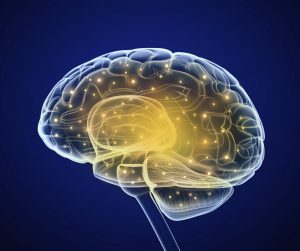
April 1, 2017 – When people hear the word “nutrition,” they often think of eating healthy fruits and vegetables, counting calories, and constant exercise. At the Nutrition Research Institute (NRI) and across the North Carolina Research Campus (NCRC) in Kannapolis, NC, these are frequent topics of scientific inquiry. But to scientists, “nutrition” is a word with a subtly different definition, one that is expansive, just like the variety of research we do at the NRI. One of our core focuses of research is determining the amounts of nutrients and other substances in food that promote a healthy brain at all stages of the lifespan. Recently we celebrated Brain Awareness Week—a nationwide action to promote awareness about the importance of brain health organized by the Dana Alliance for Brain Initiatives and the Society for Neuroscience—by highlighting the public and personal benefits of NRI brain research.
The NRI is lucky to have several scientists devoted to neuroscience research, and three of them showcased their research in a recent seminar on the NCRC. In honor of Brain Awareness Week, we decided to catch up with these scientists to learn a little bit about their research and why they do what they do. When asked about why she likes doing neuroscience research, Dr. Carol L. Cheatham, an associate professor in Psychology and Neuroscience at UNC Chapel Hill, says, “Who wouldn’t? It’s the most fascinating information processing unit on the planet.” She was referring to the ability of the brain to take in information from the five senses, process it, and convert it to things such as memory, emotion, and action. Dr. Susan M. Smith, a professor in Nutrition at UNC Chapel Hill, is in full agreement; she enjoys researching the brain’s “elegant complexity.” Dr. Natalia Surzenko, a research assistant professor in Nutrition at UNC Chapel Hill is “fascinated by the complexity of brain architecture” and finds neuroscience research “challenging and exciting.”
All three scientists work at the intersection of neuroscience and nutrition, a newly emerging research area studying how nutrition affects brain development and how well the brain operates throughout the lifespan. Dr. Surzenko studies how maternal diet and other environmental factors affect the final architecture and function of the brain. Using mice, she mimics different types of human diets during pregnancy. Later, she tests behavior in the offspring to determine how too little or too much of a nutrient during pregnancy affects how the offspring’s adult brain works. Drs. Cheatham and Smith apply similar research questions, but in a different manner. Dr. Cheatham focuses on DHA (docosahexaenoic acid, an omega-3 fatty acid) and the genetic variation behind enzymes in DHA’s processing pathway. This fatty acid, which is important for brain development in the early years as well as brain health across the lifespan, is required from the diet if the enzymes under genetic control aren’t working well enough to synthesize DHA. During pregnancy and lactation, maternal needs for DHA increase as the fatty acid is needed by the fetus and infant to build the brain. Dr. Smith investigates how iron deficiency, the most common nutritional deficiency in the world, worsens the effects of drinking alcohol during pregnancy on exposed children. Since iron is so important for proper brain growth and development, she is very interested in identifying genes that further modify iron needs in the brain and how alcohol exposure could impact those needs on an individual basis. She emphasizes “research on the brain has a direct impact on human health.”
Neuroscience research at the NRI is exceedingly varied, but with the ultimate goal of “recommending the optimal diet for each person,” says Dr. Surzenko, aligning perfectly with the NRI mission statement of providing precision nutrition. This goal is accomplished by investigating “how differences in dietary intakes of distinct nutrients overlap with an individual’s genetic makeup and environmental exposure,” she continues. Dr. Smith adds that NRI research “is important for the body, but also the brain.” As the developmental cognitive neuroscientist on campus, Dr. Cheatham agrees. Brain Awareness Week (or any other week of the year), it’s important to remember that health and nutrition affect not only the body, but also, importantly, the brain. Scientists at the NRI are conducting research in both areas to personally benefit you.

Dr. Carol L. Cheatham, Associate Professor of Psychology and Neuroscience at UNC Chapel Hill
How long have you been doing research at the Nutrition Research Institute?
Almost nine years—since the day the NRI opened!
What are some outcomes that your research has taught us about the brain?
- DHA, a fatty acid, and choline, a micronutrient, are needed to support brain development and function.
- Wild blueberry consumption can halt cognition decline in adults 65-79 years of age and improve processing speed in the brain.

Dr. Susan M. Smith, Deputy Director of Science and Professor of Nutrition at UNC Chapel Hill
How long have you been doing research at the Nutrition Research Institute?
I have been here since June 30 and am excited to be here continuing my research!
What are some outcomes that your research has taught us about the brain?
- Iron adequacy in mom is important for healthy development of a child’s brain.
- The combination of iron deficiency and alcohol exposure in utero causes lasting impairments in a child’s ability to learn, including loss of white matter in the brain.

Dr. Natalia Surzenko, Research Associate Professor of Nutrition at UNC Chapel Hill
How long have you been doing research at the Nutrition Research Institute?
I have been a part of the NRI for three and a half years, with two of those years being faculty.
What are some outcomes that your research has taught us about the brain?
- Choline levels that are either too low or too high cause permanent changes in brain structure and function by affecting early wiring in the brain.
- Choline levels that are either too low or too high change the numbers and types of neural cells that compose the brain.
